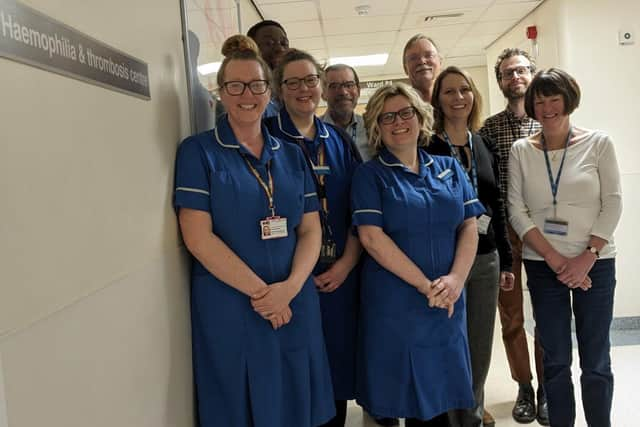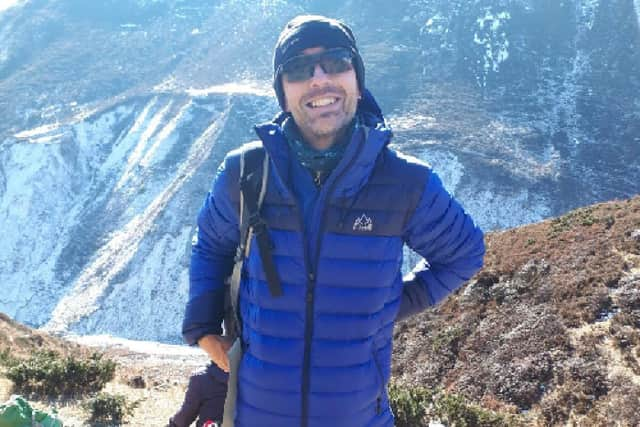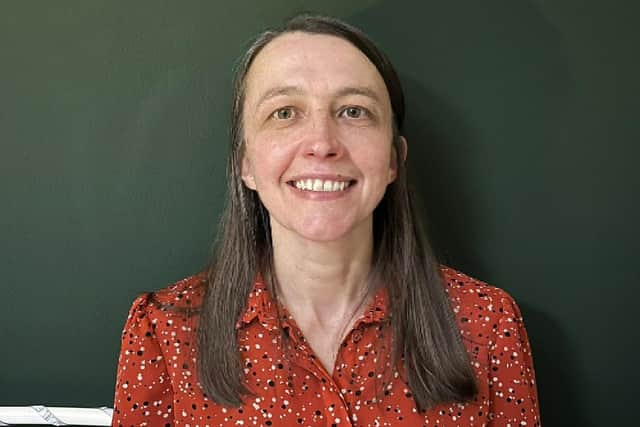“The Haemophilia Centre at Sheffield Teaching Hospitals has been a godsend."
and live on Freeview channel 276
Patients living with a common inherited bleeding disorder that causes frequent or prolonged bleeding are highlighting how specialist support from Sheffield Teaching Hospitals NHS Foundation Trust’s Haemophilia Unit has improved their quality of life.
Ian Fullilove, 59, who lives in Bradwell, and Zoe Fairbrother, 46, who lives in Matlock, both suffer with Von Willebrand Disease, a common hereditary disorder which causes the blood to clot more slowly than normal, putting them at severe risk of bleeding.
Advertisement
Hide AdAdvertisement
Hide AdThe disease, which is passed on from a parent to a child and occurs when genetic instructions to create a blood-clotting protein known as the von Willebrand factor are missing or absent, affects one in 2,000 men and women in the UK.


The pair are joining experts at Sheffield's specialist unit to raise awareness of the impact inheritable blood and bleeding disorders can have on people’s lives to mark World Haemophilia Day on the 17th April. This year’s theme is 'Equitable access for all: recognising all bleeding disorders’.
A sporty type, Ian suffered with “horrendous” nosebleeds, “traumatic” nose cauterisations and lived with the “persistent worry” of childhood bumps and knocks as a child.
As he reached his twenties, the nosebleeds started to gradually ease, and thanks to the support of the Haemophilia Unit in Sheffield he has been able to live his life:
Advertisement
Hide AdAdvertisement
Hide Ad“The staff at Sheffield have always been so kind and supportive, especially when I underwent a year of treatment for Hepatitis C around 2000, which was brutal for me. The treatment before my dental extractions reassured me that I’d be ok after the extractions. I’m subconsciously risk averse, but I have a great life and even went trekking in the Himalayas recently.”


Zoe suffered with “extremely long nosebleeds lasting 1-2 hours” as a child and was unaware she had the disease until her mid-30s when her son was diagnosed with the same hereditary condition.
“It was a huge shock. I'd never heard of Von Willebrand Disease and having to get to grips with a new diagnosis and reconsider how it had affected my life up to that point was challenging.
“The Haemophilia Centre at Sheffield Teaching Hospitals has been a godsend. When I was struggling shortly after diagnosis, they made me feel like I was cared for as a person. They now support my son and have empowered him to understand his condition and treatment options, which has built his confidence in decision making. They have helped us to live our lives as ‘normally’ as possible.”
Advertisement
Hide AdAdvertisement
Hide AdIn partnership with the Haemophilia Society’s Von Willebrand Disorder working group, the team at Sheffield Teaching Hospitals’ Haemophilia Centre held a special event to bring patients together with healthcare professionals to share experiences and champion their needs.


“The event gave us an important opportunity to share our experiences with people who genuinely understood. I learnt a lot,” Zoe said.
Ian, who also attended the event, agreed: “I had never encountered anyone outside of my family who has Von Willebrand Disease. My family never really wanted to discuss it, and to be fair, neither did I. In that sense it can be a lonely condition. I learnt about the way treatment and care has changed over the years and how the low understanding of the disease and its “little sibling” status compared to haemophilia is being challenged. I also learnt that work is ongoing to constantly improve care and treatment.”
Cathy Harrison, Advanced Nurse Practitioner at Sheffield Haemophilia Centre, Sheffield Teaching Hospitals NHS Foundation Trust, said: “Although Von Willebrand Disease is a common, hereditary disorder, the impact of frequent, or prolonged bleeding on the quality of people’s lives is not widely appreciated. Diagnosis and management also remain challenging, particularly as symptoms range in severity and awareness is low. Women can experience heavy and prolonged menstrual bleeding in addition to the bruising and prolonged bleeding that men experience.
Advertisement
Hide AdAdvertisement
Hide Ad“The good news is that with diagnosis, comes access to safe, effective treatment for the condition. Advances in treatment and care now mean patients can receive synthetic injectable concentrations of the clotting protein to prevent bleeding, and exciting novel agents being trialled for those most affected.
“The awareness day was a great way to bring the patient community together with healthcare professionals to share patient experiences, champion their needs and provide vital updates on treatment, physiotherapy, dental care and the important role of the multi-disciplinary team in looking after the holistic needs of individual patients.”
To find out more about Von Willebrand Disease visit The Haemophilia Society website or contact the Sheffield Haemophilia team at [email protected].